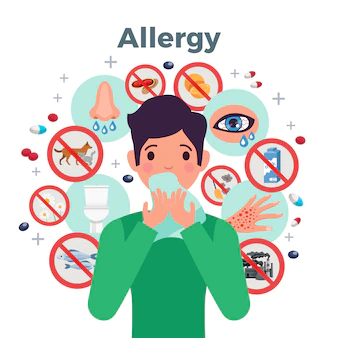Overview of Allergies

Allergies are a common medical condition that occur when the body’s immune system reacts to a foreign substance that is typically harmless, such as pollen or certain foods. This reaction can lead to a wide range of symptoms, from mild to severe, and can affect people of all ages.
Here are some important things to know about allergies:
- Causes: Allergies can be caused by a variety of substances, including pollen, dust mites, animal dander, certain foods, insect bites, and medications. When the body is exposed to these substances, the immune system releases histamine and other chemicals that cause allergy symptoms.
- Symptoms: Allergy symptoms can vary depending on the type of allergy and the severity of the reaction. Common symptoms include sneezing, runny nose, itchy eyes, skin rashes, hives, swelling, and difficulty breathing. In severe cases, allergies can lead to anaphylaxis, a life-threatening allergic reaction that requires emergency medical attention.
- Diagnosis: Diagnosis of allergies often involves a combination of medical history, physical exam, and allergy testing. Skin prick testing and blood tests can help identify the specific allergen that is causing the reaction.
- Treatment: Treatment for allergies may involve avoiding the allergen if possible, taking medications such as antihistamines, decongestants, and nasal corticosteroids to alleviate symptoms, and in severe cases, receiving emergency epinephrine injections to treat anaphylaxis. Immunotherapy, such as allergy shots or sublingual immunotherapy, may also be recommended to help desensitize the immune system to the allergen.
- Prevention: There are several steps you can take to prevent allergies, such as avoiding known allergens, keeping your home clean and free of dust and mold, wearing protective clothing when outdoors, and following any prescribed treatment plans for medical conditions that may trigger allergies.
In conclusion, allergies are a common medical condition that can cause a wide range of symptoms, from mild to severe. If you are experiencing symptoms of an allergy, seek medical attention to identify the allergen and receive appropriate treatment. With proper management, many people with allergies are able to live normal, healthy lives.
